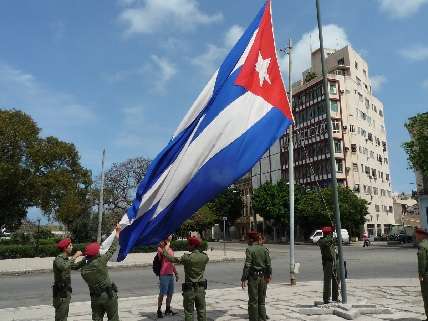On Cuba, Score One for… the Popes? And Who's Against Opening Relations Anyway?


The Associated Press reports on some of the first moves that led to the announcement the United States would re-establish diplomatic ties with Cuba, from the Vatican:
Pope Francis rightly got credit for helping bring the U.S. and Cuba together and free U.S. government subcontractor Alan Gross. But it was actually Francis' predecessor, Emeritus Benedict XVI, who made the first high-level Vatican manoeuver to release Gross, spurred in part by an unlikely group of papal lobbyists.
The Associated Press has learned that the American Jewish Committee was one of several Jewish groups that approached the Vatican before Benedict's March 2012 visit to Cuba to ask that the German pontiff raise the issue on humanitarian grounds with Cuban President Raul Castro.
Benedict is the first living former pope in more than 600 years. The U.S. cut off diplomatic ties with Cuba more than 50 years ago.
The president's move does not lift the embargo, which only Congress can do. Sen. Rand Paul (R-Ky.) backs the move, and more, saying the embargo hasn't worked. And it hasn't for a long time. Despite that, some vested interests have helped keep the status quo going along for decades. Larger Communist countries, with larger markets, have been treated as normal-ish trading partners for almost twenty years.
Who opposes the president's move? Here's Sen. Robert Menendez (D-N.J.):
Most concerning is that the decision to open relations with Cuba fails to understand the nature of the Castro regime that has exerted its authoritarian control over the Cuban people for 55 years.
There is no reason that Cuba will reform just because the American president believes that, if he extends his hand in peace, the Castro brothers will suddenly unclench their fists.
The opposite is true.
The changes to U.S. policy are clearly intended to circumvent the intent and spirit of U.S. law and Congress. It presents a false narrative about Cuba, suggesting that the United States and not the regime is responsible for its failings.
Cuba's economic struggles are the result of 50 years of failed political and economic experiments
As are the struggles of many places, some in New Jersey, that have been controlled by Democrats like Menendez for decades. They've been victim to failed political and economic experiments too, but shouldn't be punished with economic sanctions for continuing to vote for the same failed policies.
Most of the opposition, however, comes from Republicans. Here's Sen. Ted Cruz (R-Tex.):
"Fidel and Raul Castro have just received both international legitimacy and a badly-needed economic lifeline from President Obama. But they remain in control of a totalitarian police state modeled on their old state sponsor, the Soviet Union. Their government can continue to detain individuals like Alan Gross indefinitely without process—as the many political prisoners still languishing in the Castros' prisons can attest. They retain their close, long-standing ties with hostile nations, notably Russia, Iran, North Korea and Venezuela. They will continue their support for terrorist organizations from FARC to Hezbollah and Hamas.
North Korea is far closer to what the Soviet Union was than anything in Cuba today but throwing out a laundry list of loosely associated "enemies" of the U.S. illustrates the bankrupt foreign policy thinking a lot of establishment Republicans keep holding on to. Cuba's not North Korea. The North Korean regime wouldn't be interested in diplomatic relations or, more importantly, free trade, even if offered.
Menendez writes that Obama has offered the Cuban regime an "economic lifeline." Free trade is an economic lifeline, to the people living in a country, creating new economic opportunities and new wealth, making people freer. It stands in stark contrast to foreign aid, which is an economic lifeline to the people ruling a country, allowing them to keep the populations under their control dependent on their services.
Public opinion appears overwhelmingly in favor re-establishing diplomatic ties with Cuba and lifting travel restrictions. Importantly, a majority also oppose the trade embargo, and even more admit it's failed.
Cuba policy's been hanging in the air there, a softball waiting to be hit out of the park. For Cubans' sake, and Americans', hopefully President Obama did. And maybe Republicans will follow voices in their party, like Paul's and Rep. Justin Amash's, that understand the link between supporting free trade with Cuba and the principles their party says it stands for.


Show Comments (91)